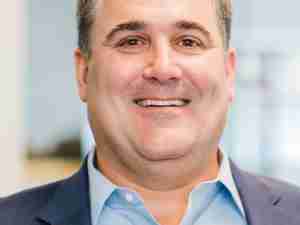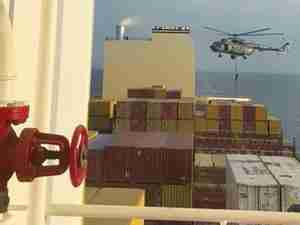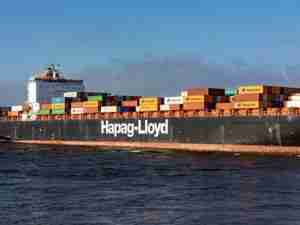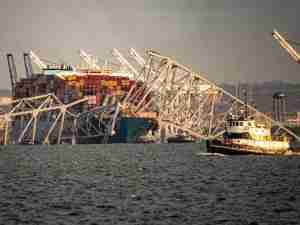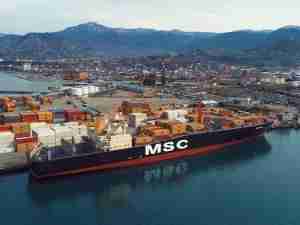The three-atomed oxygen molecule of ozone might just hold the key to keeping produce fresh on long ocean transits.
Injections of minute amounts of ozone into produce-carrying containers is at the heart of the Purfresh Transport service, formally introduced Nov. 16 at the Intermodal Association of North America's 27th Intermodal Expo in Anaheim, Calif., by officials of Fremont, Calif.-based Purfresh Inc. and Syracuse, N.Y.-based Carrier Transicold.
Already, the system has its backers, including Luis K. Valverde, Ecuador-based director of international business for Frescoperu, which has been using the Purfresh technology since April to move Latin American produce to Europe on multiweek journeys.
'With Purfresh, we can definitely change the way of doing business,' Valverde told the American Journal of Transportation in a telephone interview. 'The fruit arrives rock-firm with almost every commodity that we've shipped.'
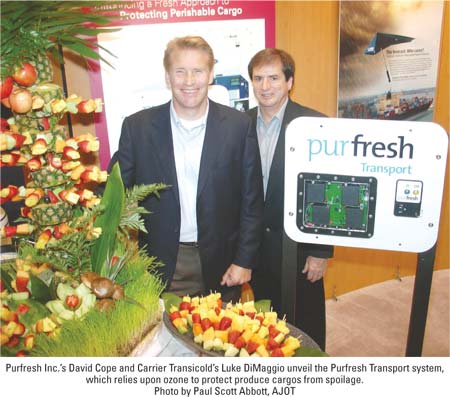
Frescoperu first tried the technology with papayas that successfully made the 17-day transit from Ecuador to Hamburg, Germany.
'We had excellent results,' Valverde said. 'The papayas arrived without any decay. The shelf life was increased as a result of Purfresh Transport.'
Frescoperu has followed up the initial test with shipments of pineapples, plaintains, organic bananas, organic mangos and green asparagus.
Typically, according to Valverde, green asparagus shipments go by air from Peru to Europe, costing as much as a mind-boggling $30,000 for shipping a single container. The recent move of asparagus to Europe by Frescoperu using a Purfresh-equipped container was done for a fraction of the cost, he said, and the product was perfectly fresh after a 24-day trip via ocean carrier.
Simply stated, the ozone purifies the container's atmosphere and surfaces ' thus helping eliminate molds, yeasts and microscopic bacteria ' in a chemical-free manner that is approved by the U.S. Department of Agriculture for organic produce and that has the approval of the U.S. Food and Drug Administration as safe for treatment of food. The ozone also regulates the levels of ethylene, a hormone given off by fruits and vegetables that is known to accelerate ripening processes.
Now that laboratory studies and commercial trials have been completed, Purfresh is teaming in an exclusive agreement with Carrier Transicold to begin offering the technology throughout the world. Purfresh Transport service is slated to be available in the first quarter of 2010 in shipping lanes between Chile and the U.S. West Coast, with plans by Carrier to roll it out globally throughout the coming year.
Carrier Transciold, a provider of transport temperature control and anti-idling solutions with a complete line of equipment for refrigerated trucks and other units, is a division of Carrier Corp., the world's largest supplier of heating, air-conditioning and refrigeration solutions. The parent firm is a part of Hartford, Conn.-based United Technologies Corp., which furnishes products and services to aerospace and building systems industries worldwide.
'With Carrier's Purfresh Transport service, a strong protective link has been added to the global cold chain,' said Luke DiMaggio, general manager of global service operations for Carrier Transicold's Container Products Group. 'Globally, up to 20 percent of post-harvest losses on average occur during transit. Purfresh technology utilizes ozone to help eliminate bacteria that spoils cargo and profits for growers, exporters, importers and shipping lines.'
Carrier plans to lease Purfresh Transport active purification systems to customers on a per-trip basis, with Carrier's worldwide service centers handling logistics and installation and removal of the systems on refrigerated containers prior to loading and after unloading at final destination. The portable, modular units each measure just a few squ
